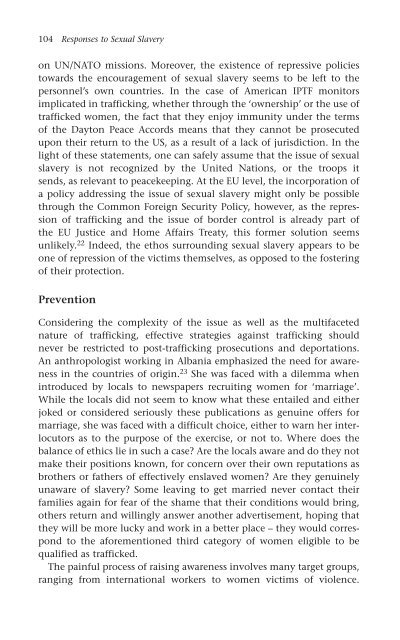3071-The political economy of new slavery
3071-The political economy of new slavery
3071-The political economy of new slavery
You also want an ePaper? Increase the reach of your titles
YUMPU automatically turns print PDFs into web optimized ePapers that Google loves.
104 Responses to Sexual Slavery<br />
on UN/NATO missions. Moreover, the existence <strong>of</strong> repressive policies<br />
towards the encouragement <strong>of</strong> sexual <strong>slavery</strong> seems to be left to the<br />
personnel’s own countries. In the case <strong>of</strong> American IPTF monitors<br />
implicated in trafficking, whether through the ‘ownership’ or the use <strong>of</strong><br />
trafficked women, the fact that they enjoy immunity under the terms<br />
<strong>of</strong> the Dayton Peace Accords means that they cannot be prosecuted<br />
upon their return to the US, as a result <strong>of</strong> a lack <strong>of</strong> jurisdiction. In the<br />
light <strong>of</strong> these statements, one can safely assume that the issue <strong>of</strong> sexual<br />
<strong>slavery</strong> is not recognized by the United Nations, or the troops it<br />
sends, as relevant to peacekeeping. At the EU level, the incorporation <strong>of</strong><br />
a policy addressing the issue <strong>of</strong> sexual <strong>slavery</strong> might only be possible<br />
through the Common Foreign Security Policy, however, as the repression<br />
<strong>of</strong> trafficking and the issue <strong>of</strong> border control is already part <strong>of</strong><br />
the EU Justice and Home Affairs Treaty, this former solution seems<br />
unlikely. 22 Indeed, the ethos surrounding sexual <strong>slavery</strong> appears to be<br />
one <strong>of</strong> repression <strong>of</strong> the victims themselves, as opposed to the fostering<br />
<strong>of</strong> their protection.<br />
Prevention<br />
Considering the complexity <strong>of</strong> the issue as well as the multifaceted<br />
nature <strong>of</strong> trafficking, effective strategies against trafficking should<br />
never be restricted to post-trafficking prosecutions and deportations.<br />
An anthropologist working in Albania emphasized the need for awareness<br />
in the countries <strong>of</strong> origin. 23 She was faced with a dilemma when<br />
introduced by locals to <strong>new</strong>spapers recruiting women for ‘marriage’.<br />
While the locals did not seem to know what these entailed and either<br />
joked or considered seriously these publications as genuine <strong>of</strong>fers for<br />
marriage, she was faced with a difficult choice, either to warn her interlocutors<br />
as to the purpose <strong>of</strong> the exercise, or not to. Where does the<br />
balance <strong>of</strong> ethics lie in such a case? Are the locals aware and do they not<br />
make their positions known, for concern over their own reputations as<br />
brothers or fathers <strong>of</strong> effectively enslaved women? Are they genuinely<br />
unaware <strong>of</strong> <strong>slavery</strong>? Some leaving to get married never contact their<br />
families again for fear <strong>of</strong> the shame that their conditions would bring,<br />
others return and willingly answer another advertisement, hoping that<br />
they will be more lucky and work in a better place – they would correspond<br />
to the aforementioned third category <strong>of</strong> women eligible to be<br />
qualified as trafficked.<br />
<strong>The</strong> painful process <strong>of</strong> raising awareness involves many target groups,<br />
ranging from international workers to women victims <strong>of</strong> violence.


